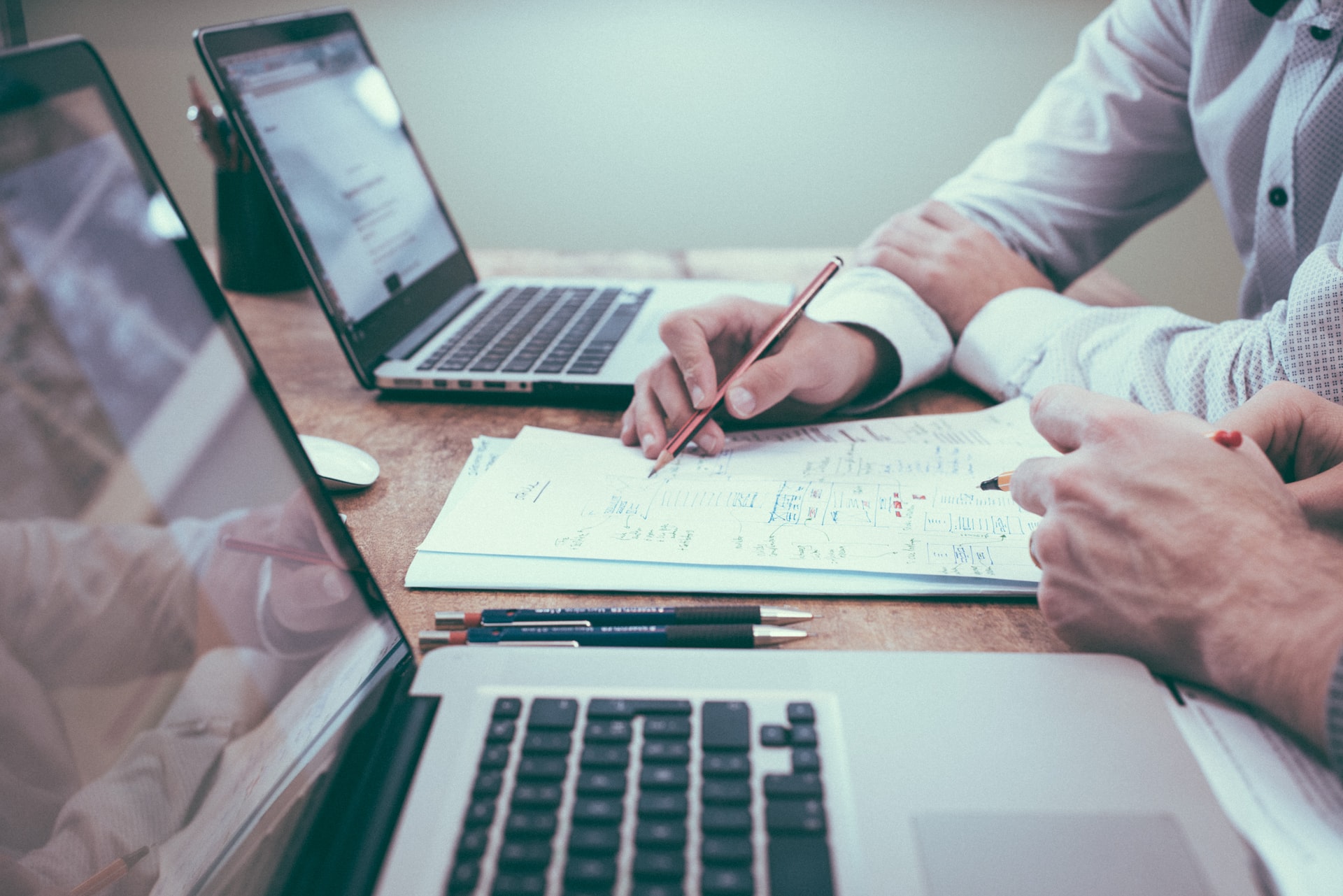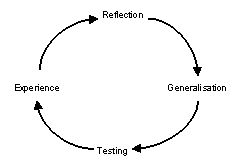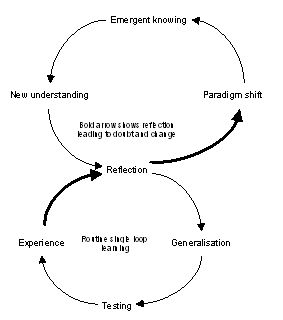Adaptive Management and Learning Processes

Ojha et al, (2004) propose that adaptive management requires that there is learning through experience in a more conscious way, specifically by incorporating explicit learning into management plans and action.
If it is assumed that policies and plans for adaptation to climate change are based on incomplete knowledge then an investigation into appropriate responses requires a process of inquiry, experimentation and reflection. This approach is similar to cycles of adult learning as described by Kolb (1984) referred to later. In designing such a process one has to be detached from any specific outcome and open to new understanding as it emerges through the process. This requires making space for reflection on the process itself as well as the content of what is new, interesting, surprising or confusing that is coming out of the process and thus what is being learnt. This could be described as a process of monitoring progress with the monitoring focussing on the process of learning (learning oriented monitoring is discussed in more detail by Paudel and Ojha, (2002)).
Processes of Learning
By learning, I am referring to processes similar to that given as levels 4 and 5. in Saljo’s classification of learning i.e.
- Learning as making sense or abstracting meaning. Learning involves relating parts of the subject matter to each other and to the real world.
- Learning as interpreting and understanding reality in a different way. Learning involves comprehending the world by re-interpreting knowledge. This could also mean the co-construction of knowledge between actors in dialogue.
Brockbank and McGill (1998) describe a model of learning that is an amalgamation of the ideas of various thinkers. The concept of single and double loop learning was first described by Agyris and Schan in the 1970s. Originally the work focussed on organisational learning but it is equally applicable to individual learning. Learning in adults was described by Kolb (with influences from Piaget, Freire, Haberman, Dewy and others) as cycles of experience, observation and reflection, abstract conceptualisation or generalisation and active testing which leads back in to a new cycle of learning (Kolb & Fry (1975)).

For Agyris and Schon learning occurs through the detection and correction of errors. They suggested that if there is a problem people initially try to tweak their existing strategies rather than question the fundamental assumptions of the theory that was used to develop the strategies. In ‘single loop’ learning an individual (or organisation) becomes increasingly skilled in an activity in a cycle that might be similar to that described in Kolb’s learning cycle as illustrated above. In an organisaton this could be seen as the transfer of knowledge and skills and immediate problem solving that can generate improvements in existing practice and procedures. This is useful when you want to make a process more efficient and external elements remain fairly constant and predictable. ‘Double loop’ learning occurs where there is a paradigm shift in understanding. The people involved start to think on a different level i.e. they start to question the questions that are being asked or the assumptions behind them. They may ask whether they are the ‘right’ questions and how they could be improved to more clearly understand the issues. In a double loop people begin to question their own and others framing of the issues and this can start to open up new questions for exploration. Creativity and diversity can have an important influence here as does self-reflection and learning through practice (Goold, 2006).
The following diagram illustrates that moments of ‘deep’ learning or learning where there had been a sense of a transition between one frame of reference and a new frame. As all visual representations of such simplicity it does not capture everything and it gives no real sense of how long each stage takes, the emphasis on the transition period (illustrated as the point where the two cycles meet) is useful as people do often described such transitions between frames as being very brief e.g. ‘a road to Damascus experience’, ‘the penny dropped’, ‘I had a flash of inspiration’. This transition period can be an uncomfortable or painful process followed by a clear new way of seeing things or a period of confusion during which a new frame is developed.

As learning for change requires shifts in understanding, either as individuals or as groups, second-order (or double-loop) learning seems to have great potential for exploring the process of adaptation to climate change as this is a situation where no one person has the answer, we all have a piece of the truth and there is a need to come up with some imaginative and ‘out of the box’ solutions.
Learning is not just on the conceptual, intellectual level although that is the level most highly prized by academia – other levels also need to be considered in order to find holistic solutions. Change can occur on a number of different levels – emotional, conceptual, physical – a change in the way we act, consciously or unconsciously, and not just that which results in tangible material adaptation. Bateson, G. (2000) coined the term deuterolearning to describe the concept of improving the way we learn to learn. Developing a capacity to question our understanding of what is going on is perhaps in important part of developing capacity to adapt to climate change.
(0) Comments
There is no content